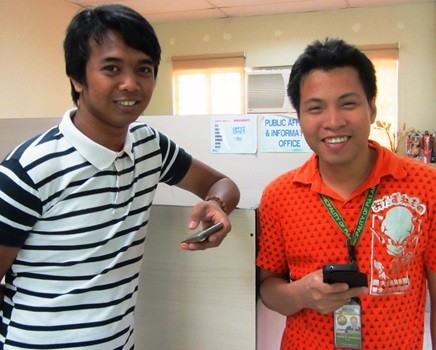
Sept. 2014—Jomar Francisco and Sylver Peralta are loyal employees of the Pulilan municipal government in the Philippines. They are fascinated by the novel way that they now receive their salaries. Last year, the city introduced a mobile money-enabled payroll system. Francisco and Peralta can now safely and easily receive salaries and make financial transactions through their mobile phones.
Prior to this new system, the city dispersed weekly payroll at its treasury office and employees had to line up during their lunch break or after work to receive their income, which was paid in cash. This was a tedious, tiresome experience. It was also unsafe because of the significant amount of cash that they carried with them on the way home, which was usually through public transportation.
“It used to take more than one hour to wait in line for my salary,” remembers Francisco, who has been a layout artist for the city for five years. “Now it’s much safer and faster because it’s electronically transferred to our mobile phones. Plus, we received debit cards that are tied to our accounts and we can use them anywhere that accepts cards. We can even use the cards to withdraw cash from ATMs.”
USAID’s Scaling Innovations in Mobile Money Project introduced mobile money payroll to the Pulilan municipal government in August 2013. The project aims to improve efficiency in government transactions and provide more financial opportunities to unbanked populations of the country. USAID facilitated Pulilan's partnership with mobile money provider BPI Globe BanKO for the payroll platform.
Pulilan is a pioneer in adopting mobile money for government payroll and has already experienced rewarding returns. The movement to mobile money payment reduced transaction costs by up to 90 percent, from $126.37 (5,307.50 Philippine pesos) to $12.35 (PhP519) per payroll period of 15 days.
Plus, the mobile money system has helped Francisco and Peralta in ways beyond receiving their salaries and purchasing goods with their ATM cards. "We can use mobile money for a lot of other options than just receiving salary, and I think that’s something other financial services don’t even offer," says Francisco.
Before USAID introduced this innovation, Peralta needed extra time to fulfill his monthly financial obligations such as paying bills and sending money to his parents in Pangasinan. He also had to consider travel time and expenses to visit the remittance centers.
“It was costly to send money to my parents,” says Peralta. Service fees are PhP30 [68 cents] per transaction and roundtrip transportation to the remittance centers cost PhP16 [36 cents]. Now, all I have to do is use my cellphone to send money … and it’s free!”
Francisco, on the other hand, is using his mobile money account as an additional source of income. He sends airtime load to friends and coworkers, and the 10 percent rebate helps him earn a little extra money.
Yet another benefit of the new mobile money system is that the Pulilan Water System now accepts utility payments.
“We are eager to try this in the future, and we’re looking forward to paying utility bills via mobile money,” say Francisco and Peralta. “Other rural governments should use the mobile money system because it would help more people, as it did for us.”
USAID is increasing the uptake and usage of mobile money services by working with national agencies and local government units, microfinance institutions and cooperatives, and small- and medium-scale enterprises. Apart from Pulilan, Bulacan, USAID has piloted mobile money services in Quezon City, Valenzuela City and Batangas City.
The project brings financial opportunity to an otherwise underserved community. This contributes to USAID’s goal of achieving inclusive and sustainable growth for all Filipinos, ultimately leading to a more prosperous, stable nation.
Scaling Innovations in Mobile Money, a two-year project that ran from April 2012 to August 2014, is part of the U.S.-Philippines Partnership for Growth initiative—a whole of government effort that goes beyond traditional foreign assistance to place the country on a path to sustained, more inclusive economic growth.
LINKS
Follow @USAID_Manila, on Facebook, on Flickr, on YouTube







Comment
Make a general inquiry or suggest an improvement.